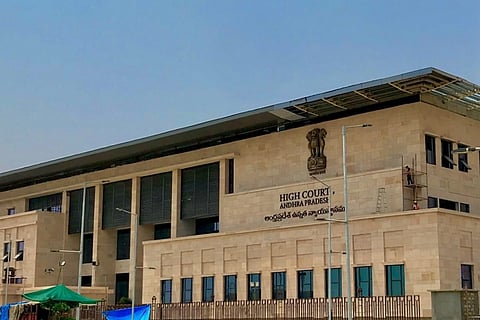

Follow TNM's WhatsApp channel for news updates and story links.
The Andhra Pradesh High Court has issued a circular instructing judicial magistrates across the state to strictly adhere to legal guidelines while remanding individuals accused in cases related to social media posts. The directive comes amid concerns over multiple FIRs being registered across different police stations over a single post or comment, particularly by members of the opposition YSR Congress Party (YSRCP) targeting leaders of the ruling TDP-BJP-Jana Sena alliance.
The circular, dated July 5, mentions that several magistrates have been remanding accused persons without following the legal safeguards aimed at protecting individuals from unnecessary arrests and preventing the misuse of criminal law to curb freedom of expression.
“It has been brought to the notice of the High Court that most of the judicial magistrates are remanding the accused in cases pertaining to social media postings/comments without adhering to the principles laid down in the Arnesh Kumar v. State of Bihar case,” the circular said.
The Arnesh Kumar Guidelines were laid down to prevent unnecessary arrests by police officers in cases where the offence carries a maximum prescribed sentence of under seven years. They require police officers to clearly record the reasons that necessitate an arrest, justifying their actions.
The circular also referred to the 2025 Supreme Court verdict in Imran Pratapgarhi vs State of Gujarat, which dealt with the registration of FIRs in cases pertaining to freedom of expression.
Quashing an FIR against Congress MP Imran Pratapgarhi over a poem he shared on social media, the judgement also addressed the application of Section 173 of the Bharatiya Nagarik Suraksha Sanhita (BNSS), which deals with the procedure for handling information in cognizable cases and the subsequent registration of an FIR.
The judgement noted that Section 173(3) of the BNSS provides an exception in cases of cognizable offences carrying a punishment of three to seven years, empowering the police officer to conduct a preliminary inquiry to ascertain whether a prima facie case exists for proceeding in the matter, with the permission of a superior officer.
The Supreme Court, in this verdict, observed that when a case falls under clause (2) of Article 19 of the Constitution (reasonable restrictions on freedom of speech), if BNSS Section 173(3) is applicable and a preliminary inquiry is conducted before registering an FIR, it would help ensure that the fundamental right to freedom of speech remains protected.
Referring to this verdict, the Andhra Pradesh High Court circular stated, “The Hon’ble Supreme Court of India, with an aim to prevent misuse of criminal law to stifle free expression, while quashing the FIR, held that the police, before registering an FIR involving speech, writing, or artistic expression (where the offences carry three to seven years of imprisonment), must conduct a preliminary inquiry under Section 173(3) of the BNSS. Such an inquiry shall be preceded by approval from the Deputy Superintendent of Police, and must be concluded within 14 days.”
The circular directed all judicial magistrates to “satisfy themselves” before ordering the remand of any accused, particularly in cases related to social media posts, that the investigating officer has followed the legal guidelines laid down in the Arnesh Kumar and Imran Pratapgarhi cases. Magistrates must ensure that there is sufficient reason to remand the accused to judicial custody, such as a history of repeated offences, the possibility of influencing witnesses or tampering with evidence, or the need for police custody for investigation.
The High Court warned judicial magistrates that failure to follow the instructions in the circular would make them “liable for contempt of the High Court besides facing departmental inquiry.”